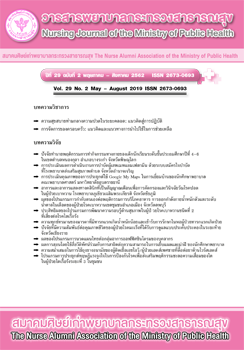Comfort amidst Pain during Childbirth: From Theory to Practice
Main Article Content
Abstract
Kolcaba’s Nursing Theory explains concepts about comfort, stating that comfort can occur, even when people are faced with health-threatening situations. The same is true for comfort during childbirth in which positive feelings can occur. And if comfort during childbirth is properly promoted, women in labor can perceive greater comfort. Even when pain is unavoidable, feelings of comfort can originate with the woman in labor as a result of preparation for childbirth and care from health providers based on physical, psycho-spiritual, social and environmental needs met during childbirth. This paper proposes concepts on comfort as it applies to childbirth. The instrumentation employed evaluated comfort during childbirth, promotion of comfort and the experiences of the author as a guideline for the care of women during labor and childbirth.
Article Details
บทความและรายงานวิจัยในวารสารพยาบาลกระทรวงสาธารณสุข เป็นความคิดเห็นของ ผู้เขียน มิใช่ของคณะผู้จัดทำ และมิใช่ความรับผิดชอบของสมาคมศิษย์เก่าพยาบาลกระทรวงสาธารณสุข ซึ่งสามารถนำไปอ้างอิงได้
References
2. Dick-Read G. Childbirth without fear. 5th ed. New York: Harper & Row; 1984.
3. Kolcaba K. Comfort theory and practice. New York: Springer Publishing; 2003
4. Ritthiruan N, Supprasri P, Siriarunrat S. Effects of empowerment program on labor pain copingand women’s perception of childbirth experience. Princess of Naradhiwas University Journal. 2017; 9(3):48-56. (In Thai.)
5. Kolcaba K. Holistic comfort: Operationalizing the construct as a nurse-sensitive outcome. Advance in Nursing Science. 1992;15(1):1-10.
6. Kolcaba K, Schirm V, Steiner R. Effect of hand massage on comfort of nursing home residents. National Gerontological Nursing Association.2006;27(2):85-91.
7. Schuiling KD. Exploring the presence of comfort within the context of childbirth. [Doctorate of philosophy’s dissertation in Nursing]. Michigan: The University of Michigan. 2003.
8. Chuntharapat S. The effects of using a yoga program during pregnancy on maternal comfort, labor pain, and birth outcomes. [Doctorate’s thesis in Nursing (International Program)]. Songkla: Prince of Songkla University. 2007.
9. Manuch M, Phumonsakul S, Khanobdee C. The relationship between receiving pain medication, sense of control, perceived nurse support, and comfort during labor of first-time mothers. The Southern College Network Journal of Nursing and Public Health. 2017; 4:46-60.
10. Leaungsomnapa Y, Prasertsri N, Chaiyasung P, Suworawatanakul W, Sananpanichkul P. Sananpanichkul P. Pain catastrophizing: concept and application to pain research in Thailand. J Prapokklao Hosp Clin Med Educat Center. 2015; 32(3) : 256-69. (In Thai).
11. Sriurai S, Subgranon R, Boonyanurak P, Wangsukpisan A. Effect of the use of primary nursing model that integrates social support concept on birth experience perceived by women during delivery. Kuakarun Journal of Nursing. 2016; 23(1):21-40. (In Thai).
12. Sudphe S, Thananowan N, Yusamran C. Impact of a husband-assisted first-stage labour programme on primigravidae’s labour-related stress, pain and satisfaction. Thai Journal of Nursing Council. 2014; 29(3): 42-54. (In Thai).

